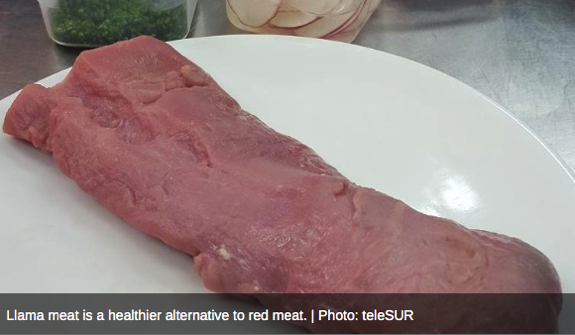
Scared Red Meat Causes Cancer? Bolivia Says: Try Llama Instead
November 6, 2015 - telesurtv.net
Bolivia is promoting llamas as a healthier alternative to red and processed meats.
Tired of eating red meat? Worried it's bad for your health? Then Bolivia's Health Ministry has an alternative: eat llama instead.

Llamas are mostly famous across the Andean region as pack animals—and for their soft, shaggy wool. Tourists who visit Peru and Bolivia buy llama wool jumpers, hats and scarves in droves.
But now llamas are becoming famous for another reason: their low-fat, high protein meat.
Interest in llama meat is soaring since the World Health Organization warned last month that an excess of red meat could cause cancer.

"It has a very low-fat content, so when consumed it gradually reduces the levels of cholesterol in our system," Dr. Yecid Humacayo, a nutritionist with Bolivia's Ministry of Health, told teleSUR English. "It's definitely a better alternative to beef or pork."
Indigenous Bolivians have been eating llama meat since pre-Colombian times. For many years it was considered a ''poor man's'' meat.
But recently there's been a shift in public opinion on this once humble meat, with health conscious dieters embracing its benefits.
It's no longer just a poor substitute for beef. Indeed, it's now popping up in the smartest high-end restaurants in Bolivia.
La Comedie, a French restaurant in La Paz, is one of those fancy restaurants now serving the popular meat. Its mission is to reinvent the way that llama meat is prepared and cooked. And it has developed two unique llama dishes.
"The first is deep-fried llama chicharron, which is a typical Bolivian dish usually made with pork," Chef Marcelo Bolanos Cirilo told teleSUR. "The other is llama served with special spices and sauces—and the tourists can't get enough of them both."
Bolivian llama meat has become so fashionable that it's even being exported.
"I know from our producers that they're exporting it to Germany and to other European countries because it's considered a healthy meat," restaurant manager Antonin Libovicky told teleSUR. "It's low fat and there's not many carbs."
Still, despite its known benefits, Bolivia's Health Ministry notes that "all excesses can cause harm."